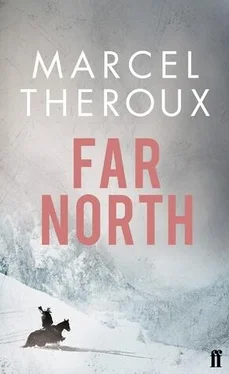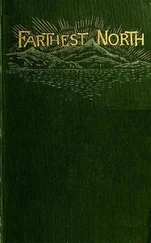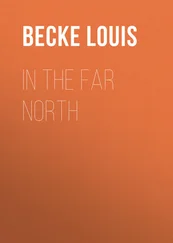But something more than the practical concern about the time of year and the provisioning for the journey kept me from leaving.
Out in the yard, the prisoners were crossing to their bunkhouse.
In the twilight, you might almost think that I was looking out at the old world right here. There was a farm, and these were workers, idling in the cold night air in twos and threes on the other side of my filthy window.
One of them was Shamsudin. I knew him by his gait. None of the prisoners moved with urgency, but Shamsudin went especially slowly nowadays. Lately he’d begun to stoop a little too. He was one of the oldest at the base by now. This was our fourth winter in that place, heading into our fifth summer. We hadn’t exchanged a word with one another for over a year.
The hard life at the base had aged him. I had noticed him working in the fields over the past months, resting on his shovel more often and breathing hard. There was a kind of defiant slowness in the way some of the younger guys worked, as though they were daring you to chivvy them. But the older ones like Shamsudin worked slower because they were weakening, and they needed to conceal it. There was a casualness about the way they moved, but its root was deep fatigue. Sometimes you’d surprise one of the older ones where he wasn’t expecting to be seen, flat on his ass behind a wall, legs splayed in front of him, his face slack with exhaustion and hollowed out like a corpse’s.
There was no one in the base much past fifty. Disease and the foul weather tended to do for them after that. Even on the guards’ side there wasn’t much grey hair.
The oldest prisoners only had two hopes. One was that they would be made a guard, but it got less likely the older they became, and never happened at all if they were a muslim. The other was to find easier work in the Zone.
It was pitiful to see the effort they went to when they heard that a round-up of men was about to happen. They’d shave and comb their hair the night before. Once an old fellow they called Tuvik put on a fresh shirt he’d been saving somehow and pinned a bar of medals to it. He jutted his skinny jaw as the guards’ eyes fell on him. They moved past without choosing him and his adam’s apple bobbed once or twice.
One of the half-Tungus prisoners teased him for it as we walked back to the hut. ‘Where did you steal those medals, Tuvik, you old thief?’
That was too much for Tuvik’s wounded pride. ‘I fought two years in the Pacific war. I lived in a submarine and killed Japs and chinks like you with my bare hands!’
The Tungus boy laughed at him and fended off Tuvik’s reedy forearms as he came to strike him. Tuvik’s hands looked like bird-claws in the boy’s meaty brown fists.
The Tungus boy stole the medals that night and lost them the next day at cards. A week later, Tuvik died in his sleep.
It was the guards as much as anyone that fed our dreams of the Zone. When I was a prisoner, they’d drop casual remarks about what we’d find there. The refrigerators in the guards’ village, the generators, our weapons — all of them were made there, they said. Someone even said they had a picture house.
I was curious to see it myself, but most of all I thought it would be good for Shamsudin to get there.
There was a growing sense of defeat about him. That day on the roof I had a glimpse of the man he might have been. Some of those others slipped into life at the base like they’d known no other — perhaps they hadn’t, or known worse — but Shamsudin still carried about him some dignity, like a fading scent of the world he’d come out of.
It struck me that a man like Shamsudin would be welcomed in the Zone. He might have to do menial work at first, but any place with a little ambition would soon see the value of him — a man who had travelled and knew languages, who knew the name of every muscle in the human body. People like me were ten a penny in that place: practical, tough-minded ones who knew ways to grub in the tundra to stay alive. But Shamsudin had knowledge that could only be got from books. I couldn’t say the use of all of it. Sometimes I know it seemed foolish and a little strange, like a silk tie round the necks of one of those prisoners. But what he knew had been thought precious by people who knew more than we did. What he had in his head had been hoarded up over centuries. It was precious enough for blood to be spilt over it. It took a thousand years of study for him to know the things he did — a thousand years of science and testing and people prepared to die to say the earth went round the sun and not the other way around. And once it was lost, it would take another thousand years to learn it again.
It made me sad to see him weakening. He seemed to go into himself and spend less time with the other muslims. I wished I could take him out of that place somehow. He reminded me of one those books that I used to hide in the armoury. Only a person is always better than a book.
So at the back of my mind was the thought of the good I might be able to do for him. And the good that could be done if I could find a way to link him up with the people in the plane.
The way things looked, he had at most two years to live. Perhaps less. Sooner or later he’d wind up in the clearing where they’d put Tuvik.
Each fall before the ground froze, the guards marched half a dozen prisoners out to the woods to dig a deep hole. Come the thaw, they marched them out again to put the earth back over the fifteen or twenty bodies that had been dumped there over the winter. There was no ceremony to the burials. A couple of guards would slip the body into a sack and haul it out on a cart, toss it in the hole and throw powdered lime on it. It waited there uncovered until the next one.
Weighing it up in my heart, I felt like I had a duty to do right by Shamsudin. There are reasons behind reasons, of course, and if you go into them too deeply you end up tripping over yourself. Looking back at it now, I see I had some kind of feelings for him, since he was the first person to show me an ounce of kindness since Ping. And he had a way about him that reminded me of my father, I think, and I wonder if maybe I was trying to go back and save him . But if I search behind that, I come up against a plainer reason. Since Ping died, it felt like I had lost the knack of being alone.
When I was a child, there was an old man in the woods who lived alone, miles from anyone, who we were warned from visiting. He was a Russian called Pankov who did big wooden carvings that he stood in his yard. We would sneak over to spy on him, and he would yell and chase us away if he caught us there. Being children, that wa sport to us. ‘Madder than an outhouse rat,’ my father called him, and he slippered us when Charlo blurted out that we’d been over there.
Pankov died when I was about twelve, and a party of elders from our town buried him in his yard. The hut he’d lived in fell a little more apart each year after that, until it was all flattened, as though something big had sat on it.
I went there once or twice in the years that followed. Pankov had sculpted whole tree trunks into big, busy columns of snakes, and demons, and wriggling, bosomy women that the elders politely ignored when they went to inter him.
Whatever had flattened the house — snow? woodworm? — had scattered its contents around the yard. And amid all the stuff you’d expect — torn bed sheets, candlesticks, mouldy shoes, broken glass — was page upon page of musical scores, piles of them, with their pretty lines and black dots. What must they have meant to him, that he went to the trouble of carrying all that paper out there with him, and keeping it, year after year, where there was no one to share it with, not an instrument, only the silence, and the little creaks and whirrs of his own body failing bit by bit?
Читать дальше












